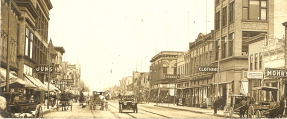SHEBOYGAN HISTORY

SHEBOYGAN HISTORY |
 |
|
| Home | Yearbooks | Students | Biographies | History | Phone Books | Churches | Pictures | Links | ||
Hon. Major C. Mead, Page 588
HON. MAJOR C. MEAD, a lawyer of Plymouth, and late State Senator, is a native of Sheboygan County, and was born in the town of Lyndon, June 26, 1858. He is a son of Abel and Permelia (Peck) Mead, who were natives of the Empire State. His father was born in Putnam County, and his mother near Albany. They were descended from old New York families. In 1848, the family came West to Wisconsin, and settled in the town of Lyndon, Sheboygan County. For a fuller account, see sketch of Clark R. Mead. Our subject, who was reared on his father's farm, attended the public schools and qualified himself for the position of a teacher. he taught in the country for a time, and later was Principal of one of the ward schools of Sheboygan. Subsequently he became a student of Plymouth High School, graduating in the Class of '79. The following fall he entered the law department of the Wisconsin State University, where he received the degree of B. L. in 1881, and was admitted to practice in the Wisconsin Courts and in the United States courts. On the 29th of June, 1881, Mr. Mead was married in the town of Lyndon to Miss Rose Robinson. Mrs. Mead was born in the town of Scott, Sheboygan County, and is a daughter of Elisha and Anna M. Robinson. Soon after their marriage, Mr. and Mrs. Mead removed to Wausau, Marathon County, Wis., where for a short time Mr. Mead was engaged in the practice of his profession. In the fall of 1881, they returned to Sheboygan County, and established their home in Plymouth, where Mr. Mead has since been in active and successful practice. Three children, one son and two daughters, were born to Mr. and Mrs. Mead, Warren J., Arlisle and Jessie, all natives of Plymouth. Mrs. Mead's parents were early settlers of Sheboygan County. Her father was a soldier of the late war, and gave his life in defense of the Union, his death occurring in the hospital at Helena, Ark. Her mother survives, and resides with her daughter, Mrs. Mead. In politics, Mr. Mead is a Democrat, and has been the choice of his party for important official positions. He has served for the past eight years as Court Commissioner, and for six years as City Attorney. In the fall of 1888, he was elected to the State Senate, and served until January, 1892. He was appointed on the most important committees of the Senate, being second on the Committee on Judiciary and on Railroads, and was Chairman of the Joint Committee on Charitable and Penal Institutions. He was the author of a law abolishing the State Board of Charities and Reform and the State Board of Supervisors, and creating the new State Board of Control; also the law which provides for the destruction of ballots after the same are counted, and several other important measures. Socially, Mr. Mead is a Royal Arch Mason, a member of Acassia Lodge No. 167, A. F. & A. M., of Plymouth; and of Harmony Chapter No. 10, R. A. M., of Sheboygan. He is also a member of Hiawatha Lodge No. 520, R. A., and of Plymouth Camp No. 724, W. M. A. Mr. Mead has been in constant practice of his profession a Plymouth for twelve years. He has a fine suite of rooms in Laack's new block, and one of the most valuable law libraries in the county. His business has steadily increased from the time he opened an office, and he now enjoys a large and lucrative practice. Mr. Mead happily possesses many of the most necessary elements for success. He is well read in his profession, earnest and reliable in business, and of unquestioned integrity. In his social intercourse, he is genial to strangers as well as friends, and impresses the shrewd observer of human nature as being a man of superior ability, whose judgment and good faith can be relied upon implicitly. As a lawyer and legislator, he is widely and favorably known, and at home enjoys the confidence and kindly regard of his fellow-townsmen to a marked degree.
|
||
| Copyright © 2009 www.sheboyganhistory.com - All Rights Reserved. |